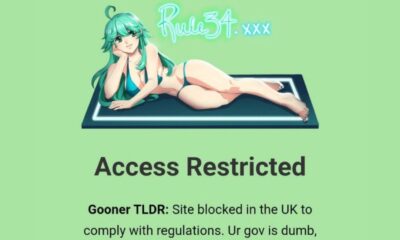Internet
The FTC just scored its first major win against fake Amazon reviews
This is a win for the internet.

Just a heads up, if you buy something through our links, we may get a small share of the sale. It’s one of the ways we keep the lights on here. Click here for more.
Fake Amazon reviews are the worst, and it’s a major problem for the ecommerce giant. Just a month ago, Facebook employees were caught red-handed for leaving bogus reviews for their Portal tablet. It’s become such a problem that there are even services sprouting up that identify these fake reviews right on the site.
Well, the jig is up because the FTC is looking to put a stop them by slapping companies that are paid to offer these sort of services with hefty fines. And just this week, the Federal Trade Commission scored a huge win with a massive settlement from a company that was spamming Amazon with fake reviews.
The first company to get slapped by the FTC was Cure Encapsulations, Inc. The company sells a garcinia-cambogia weight-loss supplement, and they were accused of paying a third-party website to write and post fake Amazon reviews on the site.
Apparently, Cure Encapsulations, Inc paid a website called amazonverifiedreviews.com to post bogus reviews for the weight-loss product under its Amazon listing. It’s also claimed that the third-party site went as far as asking reviewers to maintain an average review score of at least 4.3 stars out of the maximum 5 stars.
Clearly deceptive, right?
The FTC thinks so too, which is why they slapped Cure Encapsulations, Inc with a fine of $12.8 million, with $50,000 of it being owed immediately, while the rest of the imposed fine suspended on specific conditions.
The FTC isn’t stopping there either. They’re making the weight-loss supplement supplier to contact all of their customer who-who bought the supplement under false pretenses and notify them and Amazon that they had used fake, paid reviews to lure customers into buying their product.
Oh, it doesn’t stop there either. The company is banned from making the same or similar products unless they can prove “competent and reliable scientific evidence” that their product does what it’s intended to do.
“People rely on reviews when they’re shopping online,” Andrew Smith, director of the FTC’s Bureau of Consumer Protection, said in a release. “When a company buys fake reviews to inflate its Amazon ratings, it hurts both shoppers and companies that play by the rules.”
Hopefully, the FTC continues their crusade against fake Amazon reviews and services that promote this sort of thing. Fingers crossed.
Amazon agrees here too. An Amazon spokesperson provided KnowTechie with a statement:
We welcome the FTC’s work in this area. Amazon invests significant resources to protect the integrity of reviews in our store because we know customers value the insights and experiences shared by fellow shoppers. Even one inauthentic review is one too many. We have clear participation guidelines for both reviewers and selling partners and we suspend, ban, and take legal action on those who violate our policies.
Editor’s Update: This post was updated with a statement from Amazon.
Have any thoughts on this? Let us know down below in the comments or carry the discussion over to our Twitter or Facebook.
Editors’ Recommendations:
- A hospital in LA will soon start using Amazon Echo speakers in some patients’ rooms
- Here’s how to contact a third-party seller on Amazon
- For some reason, Amazon now sells an entire hospital room for $285k
- Amazon is deploying robots to deliver packages in one Washington town
- Amazon may be working on its own subscription-based video game streaming service

































